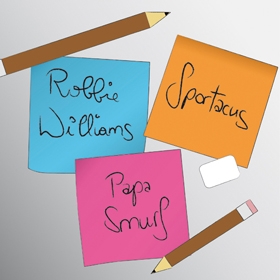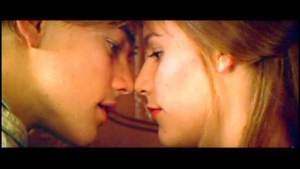 I have a feeling my Junior Certs are getting a bit fed up of my idealism. If they could say anything to me it might be “Just tell us what to write in the exam already you silly silly woman. Our mocks are around the corner. Can’t we give this ‘independent thinking’ lark a rest just for a few weeks?”
I have a feeling my Junior Certs are getting a bit fed up of my idealism. If they could say anything to me it might be “Just tell us what to write in the exam already you silly silly woman. Our mocks are around the corner. Can’t we give this ‘independent thinking’ lark a rest just for a few weeks?”
So in the spirit of helping them to ease the creeping panic (dare I suggest IN PUBLIC that it’s only the Junior Cert? relax already?) have a look at the following essay on the theme of love in Romeo and Juliet (no, that’s not a hint for what’s on the mock paper. Truth be told, I haven’t a clue what’s on in the mocks, if I knew I’d be too tempted to tell ye and that’s a big waste of everyone’s time because we don’t know what’ll be on the paper in June, do we? Oops, sorry, there I go being all idealistic again!).
As we proceed I’ll list the steps you need to take to tackle any exam question.
First have a look at the question:
“From a play you have studied, choose a theme or issue that you enjoyed and explain why you enjoyed it”
Then make a rough list or brainstorm of ideas you might discuss:
Unrequited love, passionate love, love and marriage, losing someone you love, dying for love.
Introduce the play/novel/poem and the theme/topic/character you’ll discuss:
The play “Romeo and Juliet” by William Shakespeare is one of the greatest love stories ever written. It explores unrequited love, love at first sight, societal attitudes towards love and marriage, and the consequences when ‘star-crossed lovers‘ are kept part. I really enjoyed this play because the depth of passion and devotion shown by these teenagers makes a mockery of the idea that you have to be in your twenties before you can truly understand what real love is.
Deal with each idea, answering the question, backing up the points you make with relevant quotations and using linking phrases to ‘flow’ from one idea to the next:
Initially, we are presented with a negative view of love. Romeo’s unrequited love for Rosaline has brought about a deep depression and he now believes that “love is a smoke made with a fume of sighs“. Despite her lack of interest in him, he pines for her, even going to the Capulet party in disguise just to catch a glimpse of her. I really enjoyed this aspect of the play as it cleverly challenges gender stereotypes – his behaviour is exactly what I would traditionally expect of teenage girls!
We also see that love was not really a major consideration when it came to arranging a marriage. I found this interesting as nowadays people would consider you crazy if you married someone you didn’t love! By contrast, in Shakespearean times marriages were an important way to secure a girl’s place in society. Juliet’s father was quite unusual because he wants her to play a part in choosing her future husband (“woo her gentle Paris get her heart, my will to her consent is but a part“) but he soon loses patience when she refuses to accept Paris’ marriage proposal and even threatens to kick her out of home – “hang, beg, starve, die in the streets” – for daring to question his authority. Even the Friar sees marriage as a means to an end, rather than a celebration of two people’s love for each other – he hopes that Romeo and Juliet’s marriage will bring an end to the feud (“For this alliance may so happy prove, to turn your household’s rancour to pure love“).
However, romantic love is the major focus of the play and is the aspect I enjoyed the most. Romeo and Juliet’s love is passionate and obsessive. They fall in love instantly, with Romeo proclaiming dramatically “did my heart love til now? Forswear it sight, for I ne’er saw true beauty til this night“. Juliet is equally smitten and is so determined to be with Romeo that she will disown her family if necessary “deny thy father and refuse thy name, or if thy will not be but sworn my love and I’ll no longer be a Capulet“. I have to say I found their attitude here quite disturbing. Romeo bases everything on looks “What light through yonder window breaks? It is the East and Juliet is the sun” and Juliet is similar, comparing Romeo to the stars in the sky. If this is really how love works then is it any wonder diets and plastic surgery are so popular? In my opinion, it’s possible to love someone for who they are, not purely for how they look. Believing this gives me hope, it gives hope to ‘ugly’ people everywhere, whereas by contrast the play makes you paranoid that only ‘beautiful’ people ever find love!
Furthermore, when Romeo kills Juliet’s cousin Tybalt (under extreme provocation) Juliet, although devastated, refuses to “speak ill of him who is my husband“. Their love is so strong, so deep and so powerful that they will do anything to be together. Juliet even fakes her own death rather than betray their love and marry Paris. I like how love is portrayed as a completely irrational magnetic force that possesses us completely but I’m not convinced I’d find it so easy to forgive someone (no matter how much I loved them) for killing a member of my family.
Conclude by offering your final impressions of this theme/issue/character:
Ultimately, Romeo and Juliet cannot live without each other. Romeo’s final words “thus with a kiss I die” are echoed by Juliet “O happy dagger, there rust and let me die“. Both commit suicide which is testament to the frightening and destructive power of love. The only positive to come out of this tragedy is the end of the feud but this is cold comfort for the audience who are left feeling that their love was “too rash, too unadvised, too sudden“. I can honestly say I enjoyed exploring this theme but it also made me want to stay single for a little while longer “for never was a story of more woe than this of Juliet and her Romeo“.
So to recap, how do you write a good answer?
- Answer the question asked. Do this throughout your answer, don’t just stick it in at the beginning and the end!
- Structure – do a rough plan and organize your ideas into paragraphs. Don’t repeat yourself and don’t just ‘vomit’ onto the page. Planning (quickly) before you start writing helps you to produce an organised response.
- Flow. Yes, every paragraph will deal with a different idea but you still need to create a sense of unity in your answer. After all, everything still relates back to the same thing (play or film or novel or whatever you might be discussing). Phrases such as “also” and “then” or “next” tend to be overused, so instead opt for “Initially” “Our first impressions” “As the action progresses” “Similarly” “By contrast” “However” “Nonetheless” “Furthermore” “Finally” “To conclude” “Ultimately”. (Note: be careful of the word “although” – I’ve noticed lots of students mixing this up with “however” recently. If you don’t know the difference between although and however, google it!)
- Quotes – almost every point is supported by a relevant quote, which is either integrated into the sentence naturally or put in brackets. If you don’t know what I mean about “integrating quotes” google it. I’m sure I’ll get around to writing a blog post about this issue eventually but not right now!
- Language – the language used is quite formal and shows a wide ranging and fairly complex vocabulary. This is a writer who knows that there is a difference between how you write and how you speak. If you don’t know what I mean by this, it’s possible even google can’t help you 😉 Seriously though, you are expected to control the length of your sentences when you write. You are also expected to use more formal language than you would when speaking. Your vocabulary should be varied and you should avoid slang. However, don’t do that annoying thing of using big words even though you don’t know what they mean because you think they sound impressive – if you don’t know what a word means look it up on www.wordhippo.com.
- Expression – this is an extension of your language use (see above). It’s important that your sentences are coherent and make sense; your points are clear and logical; and your grammar, spelling and punctuation are accurate (within reason – none of us are perfect!).
- Personal response – this is any sentence which shows that you have an opinion. Any idiot can learn answers out of a book of notes but it takes intelligence to think about what you have studied and form your own set of attitudes and beliefs about the characters and themes you’ve encountered. This also often links in to the question asked – the examiner wants you to show off your opinions not tell the story (for God’s sake don’t tell the story, this is the biggest mistake you can make!).
So why don’t I make all of your lives easier and just create sample answers for your studied novel and your studied play and your studied poetry? I mean, come on, I get paid to be in school. Stop being so lazy and get to the photocopier Miss!!!
Just for the record, here are the reasons I don’t do this:
- It’s an insult to your intelligence. It suggests that you don’t have the brains to figure any of this out for yourself and that you are somehow incapable of forming your own opinion about anything.
- It’s cheating if you learn off an answer and pretend you wrote it yourself. For more on my opinions of plagiarism, click here.
- It’s pointless part (a): because there is no possible way to know how the question will be phrased until you open the exam paper. If you learn off an answer you’ll be too tempted to ignore the question and just write what you’ve learned off. And then all your hard work is for nothing because if you ignore the question you won’t do well. Learn quotes, create bullet points of important ideas for characters, relationships, themes etc.. but don’t actually decide on your exact words until the day of the exam.
- It’s pointless part (b): you need to know that doing well in exams and actually learning skills that will be useful in life are not necessarily the same thing. You might know every single important quote from Romeo & Juliet but let’s face it, that’ll never get you a job. However, impressive communication skills, an excellent standard of written English, an ability to analyse large amounts of information and select what is relevant ARE all skills you’ll need in the real world.
- It’s showing off : specifically, its ME showing off. All I’d be doing is proving to you that I’m good at English. What a surprise! I’m 32 yrs old. I studied English for six years at college. It’s hardly a newsflash. So get over it. Me being good at English won’t make you good at English. Unless you practice and practice and practice. And reading for half an hour a day would also help. And taking on board my suggestions on how to improve. And generally giving a shit! (but hey, I know this can be difficult. I didn’t work hard at school until I was about 17 but I always read A LOT – about 3 books a week – so I guess it was easier for me to catch up and compensate for my laziness than it is for most people).
I tell you all of this not because I like being a royal pain in the arse, but because I genuinely care about your education. 99% of the time. Sometimes I think it’d be easier to just tell you what to think 😉
p.s. This essay is probably way too long for the Junior Cert. You’ve only got 25 minutes to discuss your studied play. It’s really important above all else that you don’t spend any longer than 25mins on any of your studied sections no matter how frustrating you find this. They are only worth 25% of your English grade in total.Between one and a half and two pages is the suggested length if you can write that much in 25minutes.
 We recently had a discussion in class of the advantages and disadvantages of various different media: Newspapers – Radio – Television – Internet. We decided we needed to compare & contrast – to think about what they have in common and about what makes them unique. Here are some of the ideas we came up with – the list is in no way exhaustive and of course is open to dispute!!!
We recently had a discussion in class of the advantages and disadvantages of various different media: Newspapers – Radio – Television – Internet. We decided we needed to compare & contrast – to think about what they have in common and about what makes them unique. Here are some of the ideas we came up with – the list is in no way exhaustive and of course is open to dispute!!!






